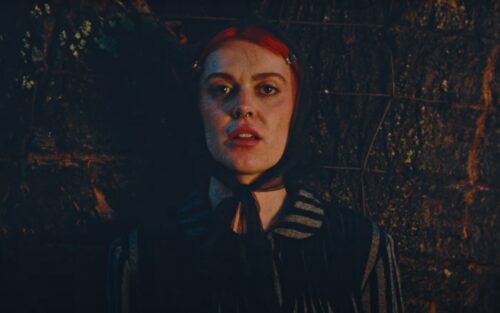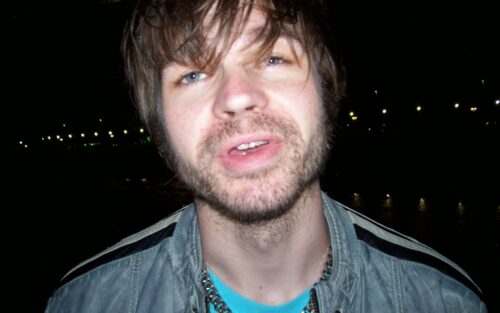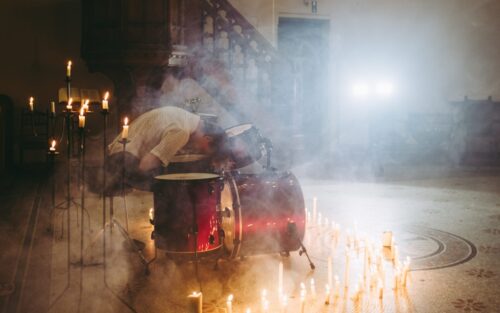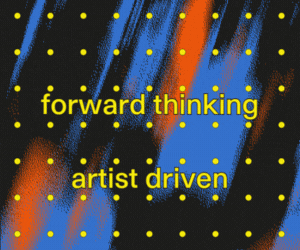PUP Keep The Dread Alive On Their Weirdest Meltdown Yet
Punk rock proprietor Stefan Babcock on writing from the perspective of a robot and making bat-shit decisions in a bat-filled mansion.
By Gregory Adams
Photo by Vanessa Heins
- Published on
Stefan Babcock often mines the ultra-personal on PUP records. On 2016’s The Dream Is Over, the vocalist-guitarist of the Toronto punk quartet weighed in on anything from inner-band tension to the death of a beloved pet chameleon; on 2019’s Juno award-winning Morbid Stuff, he examined a litany of dark and intrusive thoughts. In certain ways, he’s doing the same on his band’s latest pop-smeared blasterpiece, The Unraveling of PUPTheBand, where he attempts to push through intense periods of anxiety (“Totally Fine”) and seemingly endless waves of existential dread (“Relentless”).
“I’m a pretty open book on most of our records,” Babcock explains to RANGE. “You very much get one side of me in most PUP songs—I usually write from places of darkness; I struggle with mental health. I’m not always a depressed wreck of a human being, but it might come across that way listening to most PUP records.”
While hitting on a few familiar themes, The Unraveling of PUPTheBand is also the first record where Babcock tried his hand at writing a gushing, all-out love song. But getting into the flowerier side of his emotions, he’d discover, made him feel as corny as a discount Carlton card.
“I wanted to write a very straight ahead love song. I’d never done that before. These were the emotions I was feeling, and I wanted to capture that, [but] when I tried to write it from that first-person, ‘Stefan’ perspective, it just sounded so contrived and awful. Yeah…it was bad.”
Babcock is explaining this with a laugh from the stairwell inside Toronto’s El Mocambo club a few hours before PUP undertook their first concert in two years, at which they’d premier much of the new album for the hometown audience. This includes that failed serenade, which ultimately became the tech-twisting “Robot Writes a Love Song.” A wiry expulsion of in-the-red guitars and sugary chorus hooks, Babcock upgraded the piece by trading organic, heart-on-your-sleeve sentimentality for a more circuits-exposed look at what happens when someone crashes your hard drive (“My system menu won’t even load,” he sings).
“When I changed the perspective to a robot, it added some levity,” Babcock reveals. “These cliched sentiments that I was drawing on suddenly felt more real and powerful because I was saying them in a way that hadn’t been said a million other times before.”
The lyrics also speak to the bizarre intimacy we tend to develop while cohabiting with computers. Think of the profound sense of panic, loss, and grief that arises upon the arrival of the dreaded Blue Screen of Death. What happens to your most treasured memories, it posits, if you forget to back them up?
“I lost an entire phone’s worth of voice memos one time—hundreds and hundreds of demo ideas—which was kind of heartbreaking,” Babcock adds of some of personal data losses. “Also, I did a lot of traveling before I was in PUP, [which were] pretty formative experiences for me. I went to the Northwest Territories for a month with my sister, and I went to Asia with somebody who was really important to me. On my last week in Asia, my camera got stolen. I hadn’t backed up any of those pictures, or any of the stuff from the Northwest Territories. It was all lost to me. That’s something that haunts me a lot.”


While riffing on hallmarks of PUP’s sound—anthemic pop-punk singalongs; guitarist Steven Sladkowski’s skewed-but-sweet lead playing—even the most advanced of A.I.s couldn’t have predicted the more substantial swerves of The Unraveling of PUPTheBand.
Last year, the quartet—Babcock, Sladkowski, bassist Nestor Chumak, and drummer Zack Mykula— left Toronto to track at Grammy-winning producer Peter Katis’ Tarquin Studios in Bridgeport, Connecticut. While previous recording experiences found the act clocking out and taking the night to decompress at home, living and working 24/7 in Katis’ “bat-filled mansion” had PUP thinking about their new record around the clock. By week five, the saturation process led to some fittingly bat-shit decisions.
“I think one of most important and strangest decisions we made on this record was to start it with the world’s dumbest piano ballad,” Babcock says of the album’s introductory “Four Chords,” a piano-driven blip that finds a board of directors pontificating on the direction of the next PUP record. Adding of the spare but sarcastic piece’s origins, “Sometimes I write songs to make my bandmates laugh. They’re not for PUP, they’re not for anything. Credit where credit’s due, in the fifth week [of recording] when we were all kind of losing our minds, Nestor brought up the idea of ‘Oh, do you remember that weird piano song that you sent us months ago? We should record that and it should be the first song on this record.”
The music business treatise ended up being a recurring through-line for The Unraveling of PUPTheBand, while the devolving of each subsequent piano piece—the nine-second “Four Chords Pt. III” abruptly ends with Babcock slamming the keys in frustration— acts as a microcosm for the spiralling nature of the album sessions. “I don’t think [Chumak] would’ve pushed for it had we not been in such a weird mindset after five weeks [in Connecticut]. We would’ve done something safer, I think.”
Playing with extremes has worked well for PUP, though. While on the one hand The Unraveling of PUPTheBand includes a heartfelt ode to a neglected guitar (“Matilda”), it also concludes with a cynical parting shoutout to corporate sponsors and thoughts on buying guitar cases for the purposes of “protecting your investments” (“PUPTHEBAND Inc. Is Filing For Bankruptcy”). If the latest PUP record is indeed the sound of a band unspooling within the music business, at least their plight is hummable and hilarious.
“This is not an original thought, but there’s always a push and pull between art and commerce,” Babcock suggests. “I think the way that we have dealt with that is the same way we’ve dealt with any obstacle that we’ve [faced] as a band: to try and approach it with humour and levity, and be open about it with other people to a fault. I don’t know that many other bands who are writing about the insurance policies that they’re signing, you know?”
By Stephan Boissonneault
Nate Amos revisits a decade of stray ideas and turns them into his most compelling record yet.
By Khagan Aslanov
Mike Wallace’s electro-punk project premieres the hypnotic, percussion-driven video for "Certain Days."











